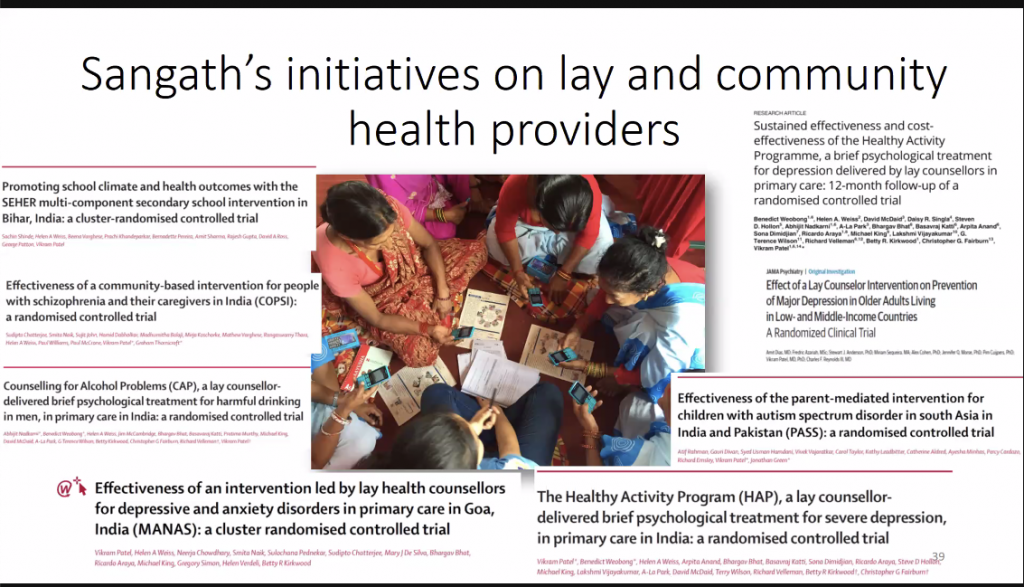By: Carina Goebelbecker, staff writer.
How can we put “care” back into health care? This was the central question posed by the “A Person-Centered and Compassionate Health Care System” zoom webinar on Friday, October 15th at 8:30am EST, organized by the Columbia Mailman School of Public Health as a part of their Centennial programming. Current Yusef Hamied Fellow Dr. Vikram Patel used personal experience, research on class division within the system, and medical data to highlight the ways in which India’s healthcare system is failing its people while proposing concrete solutions for a promising way forward.
Dr. Patel began the lecture with a story about his mother, who experienced intense mistreatment within India’s health care system over the course of more than fifty years until her death. Patel stated that through his mother’s encounters, he never came across “a physician who actually saw [his] mother as a person,” but rather viewed her as just a diagnosis. This lack of visibility is a significant problem within the medical systems across the globe, a catalyzing reason why Dr. Patel advocates for person-centered and compassionate care.
The use of Dr. Patel’s (and his mother’s) story is akin to aspects of the Narrative Medicine model. In Narrative Medicine, storytelling/receiving is a key component to the medical practice and a patient’s care. Dr. Patel’s personal frame allowed for a human-focused approach to the research and data he outlined for the remainder of the presentation.

Using the guiding examples of poor quality of care, high out-of-pocket expenditure, and accountability, Dr. Patel outlined the major problems with India’s health care system. 63% of India’s population is uninsured. Underlying Dr. Patel’s presentation was the fundamental principle that health care is a human right guaranteed to all, regardless of socioeconomic status and identity. India has one of the highest out-of-pocket expenditure rates in the world, with lower-class patients nearly twice as likely to die from certain conditions than wealthier ones. 65% of total health expenditures are out-of-pocket payments. Dr. Patel noted that health care is meant to alleviate poverty, but instead “has become the leading cause of impoverishment and [people] falling below the poverty line.”
Institutional and systemic failures combined with a general lack of empathy are the root of these issues. Government facilities make up only 10% of hospitals in their entire country, with private facilities only available to those of high status. The hierarchy within each of these institutions negatively ripples into the ways in which doctors interact with patients. Dr. Patel stated that “health professions themselves behave in a similar [hierarchical] way with each other, thanks to the rigid, historical, hierarchy which operates across the system.” Frontline health workers such as sanitation workers, ambulance drivers, and accredited social health activists (ashas), are not given the same protections as medical practitioners of more formal status.
Despite these deeply entrenched problems, Dr. Patel provided hopeful and tangible solutions to address the deficit of empathy and compassion in the system. He proposed the empowerment of frontline workers, including formalizing the employment of all community health workers with employment security and rights. Additionally, Dr. Patel highlighted the importance of giving agency to impacted communities by providing them with information and accountability mechanisms in conjunction with universal health coverage. To address the lack of humanity and biases, Dr. Patel suggested that health care workers get trained in “soft skills” such as active listening and tools to show patients respect alongside larger institutional reform and antiracist policies. Dr. Patel is proposing reform on a personal, institutional, and political level, for “medicine is a political enterprise because health is a political enterprise.” The personal is political, and a holistic reckoning and repair is the only route to remedy.
At the core of Dr. Patel’s lecture was the humanity of the bodies that interact with the medical system, a return to the basic principles of medicine and care. The things the system is failing at are the simplest. As Dr. Patel remarked, “what patients want is not rocket science, which is really unfortunate because if it were rocket science, we would be doing it.”
Photos
“Inside the maternity ward” by DFID – UK Department for International Development is licensed under CC BY-NC-ND 2.0
Slide courtesy of Carina Goebelbecker
